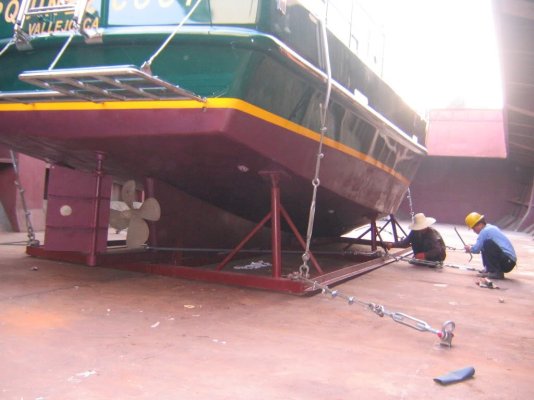Well, you will stir up a hornet's nest now.....

The two-vs-one argument is endless and unwinnable. They both have their advantages and disadvantages. On top of this will be personal preferences.
We have a GB36 with two FL120s. Together they burn about 5 gph at the rpm we run (1650). That gives us a cruise speed of about 8 knots.* If we had one FL120 we could still run at 8 knots no problem but the one engine would have to work harder to do it.* So it would burn more fuel than either one of the engines in the twin.* Which is why given the same boat and the same engines and props, the two engines in the twin will not burn twice as much fuel as the single.* They will burn more, but not twice as much.
We used to charter a GB36 with one engine. We fly floatplanes with one engine, we drive narrowboats in the UK with one engine. All our cars have one engine. When we decided to purchase a boat of our own we didn't care if it had one engine or two. As it happened, the boat that best fit our requirements and our boating budget had two engines. Now, thirteen years later, we would never buy a single engine boat. Partly because I like running engines--- I'd have three of them if they'd fit. Partly because we like the redundency--- we've needed the spare engine four times so far, three due to cooling issues, one due to a fuel transfer mistake on my part.
But the main reason a single engine boat will never be in our future is that my wife--- who has no problems flying into the remotest parts of the Coast Range in BC in a floatplane not only powered by one engine but an engine built during WWII to boot, is far more comfortable, confident, and relaxed with two engines under the floor instead of just one. And I don't care how much economic sense it makes to run one engine, it will always be trumped by what makes my boating partner the happiest.
So if it was me-- -which it isn't--- I would want two engines in that 40-something foot boat your are contemplating. Whether you burn 5 gph in that boat with 2 FL120s, that will depend on the rpm you run at. I can tell you an FL120 is happiest between about 1600 and 1800 rpm. Get down below 1500 rpm and you may have trouble keeping the cylinder temps where they should be.
Your prop question is easy. The fewer blades a propeller has the more efficient it will be. A one-bladed prop would be the most efficient but it would be a bitch to balance

However, the more blades a prop has, the smoother it will run (or the less vibration it will produce, however you want to look at it). So it depends on what your priorites are. Our boat was shipped from the factory with three-bladed props. A previous owner installed four-bladed props. We were going to switch back to three-blades but given the cost (about $1700 or so per prop at the time) and the fact that the prop shop was able to completely rework and re-pitch (down) our four-bladed props for about $350 per prop, we elected to stay with the four bladed props.
-- Edited by Marin on Wednesday 12th of October 2011 08:56:31 PM
